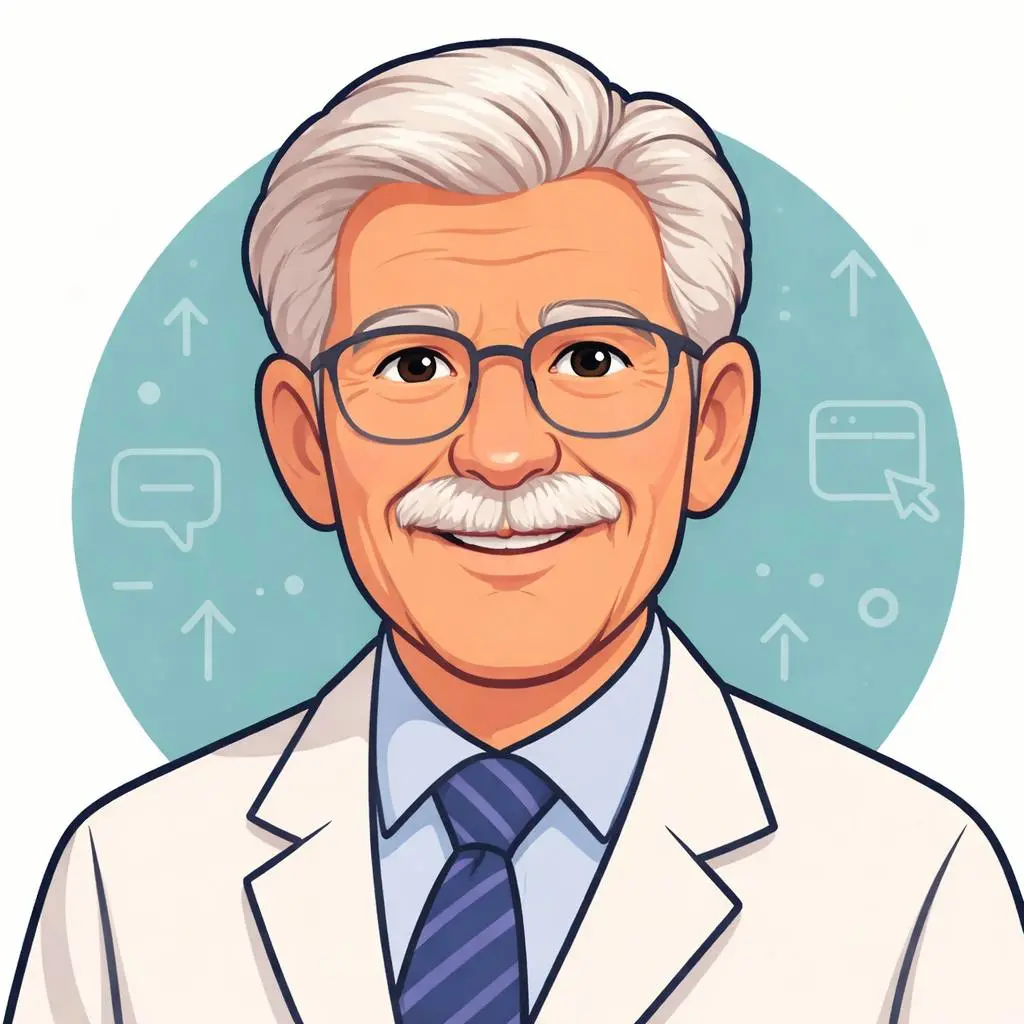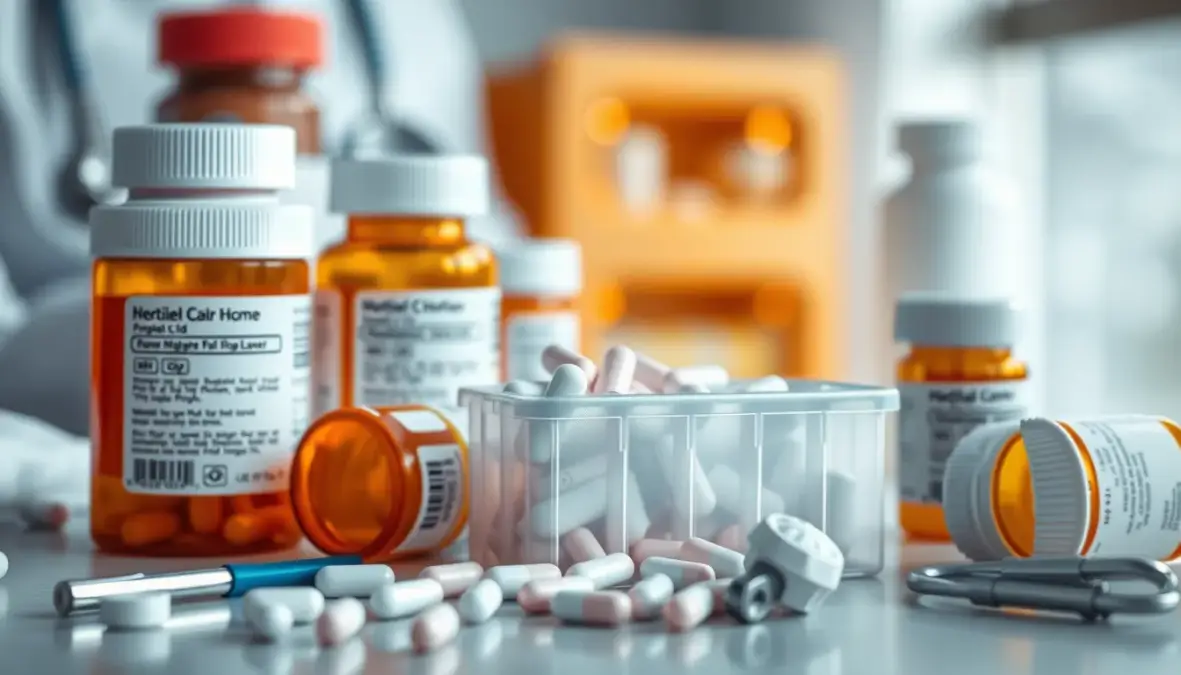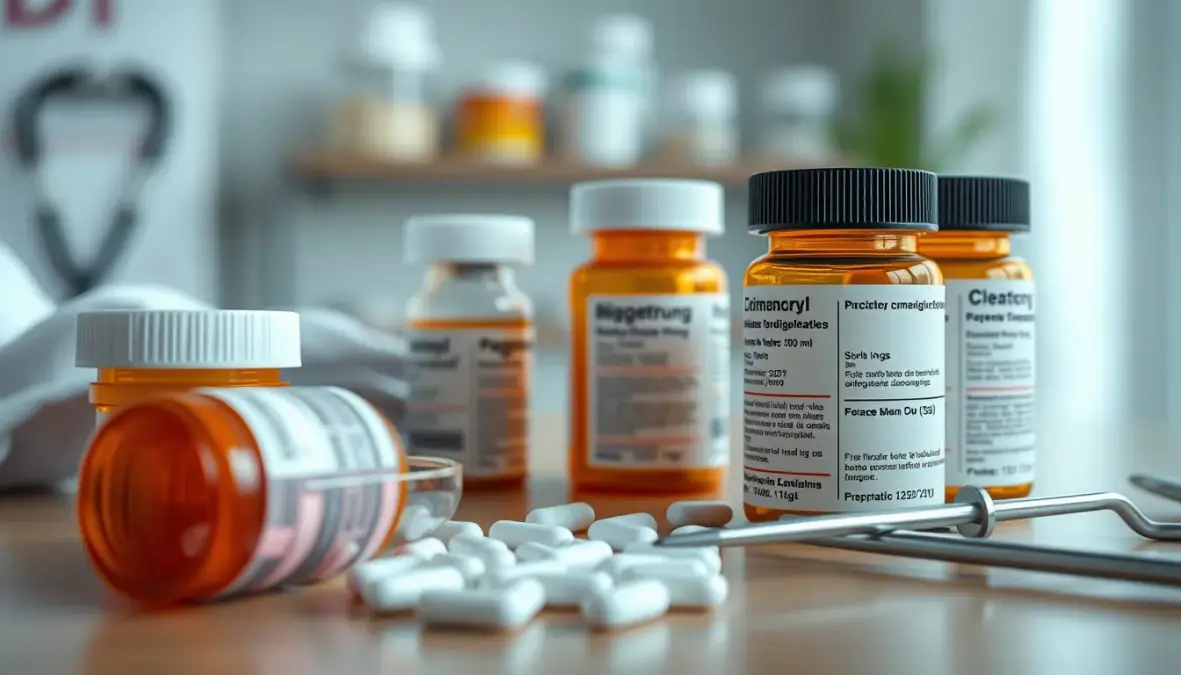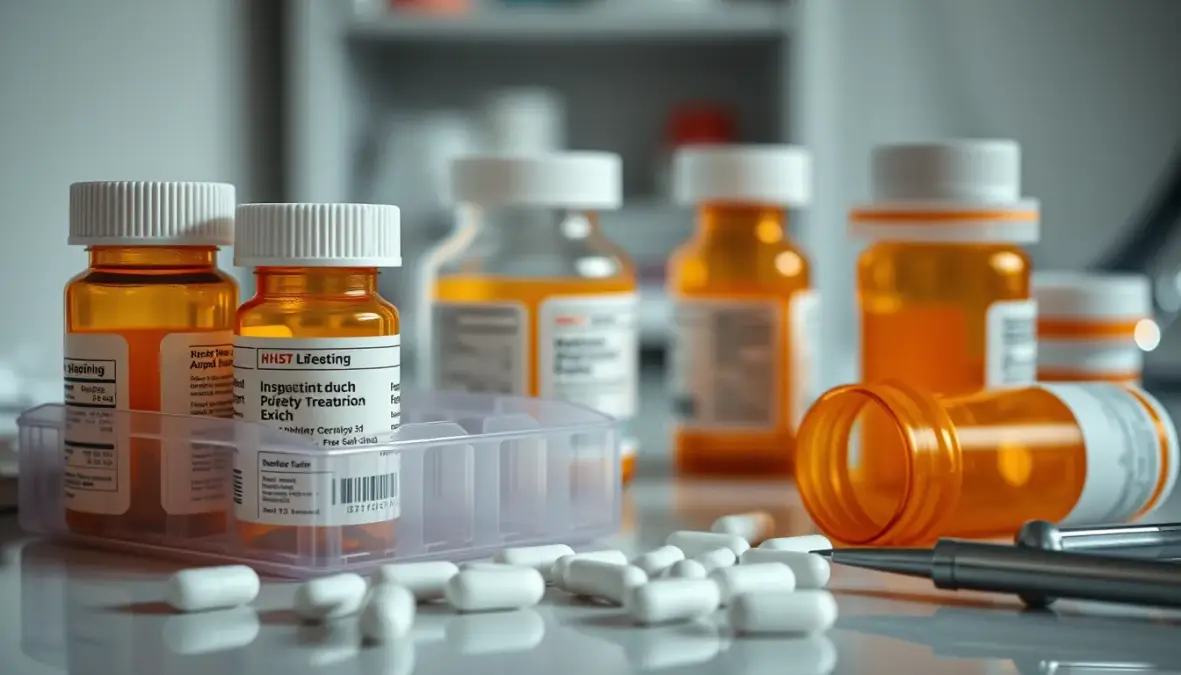Drug withdrawal symptoms are a common occurrence that many people experience when stopping certain medications, especially after prolonged use. At Pharma Care, we understand the challenges involved in this process, and our goal is to provide you with comprehensive information that will help you deal with withdrawal symptoms safely and effectively. Understanding the process and knowing how to cope can significantly ease the experience and increase your chances of success in the drug withdrawal process.
What are the effects of drug withdrawal?
Drug withdrawal symptoms are physical and mental reactions that occur when the drug is stopped or reduced after prolonged use. These symptoms occur as a result of the body's adaptation to the presence of the drug, and when the concentration of the drug in the body decreases, the body responds with various symptoms. It is important to understand that withdrawal symptoms do not necessarily indicate addiction, but rather a physiological dependence that has developed over time.
What medications may cause withdrawal symptoms?
Not all medications cause withdrawal symptoms, but there are groups of medications that are known for their potential to cause significant withdrawal symptoms:
- Antidepressants – Especially from the SSRI and SNRI groups
- Sedatives and sleeping pills – Benzodiazepines such as Valium, Clonazepam
- Opioid painkillers – such as oxycodone, hydrocodone, tramadol
- Blood pressure medications – Especially beta blockers
- Anticonvulsant medications – such as carbamazepine, gabapentin, pregabalin
- Corticosteroids – Like prednisone
- Medications to treat attention deficit disorder – such as Ritalin, Adderall
Common symptoms of drug withdrawal
Withdrawal symptoms vary depending on the type of drug, duration of use, dosage, and personal characteristics. The following are common symptoms that may occur during drug withdrawal:
| Drug group | Physical symptoms | Mental symptoms |
|---|---|---|
| Antidepressants (SSRI/SNRI) | Dizziness, nausea, headaches, "electric shock" feeling | Irritability, anxiety, mood swings, difficulty sleeping |
| Benzodiazepines | Tremors, sweating, muscle pain, seizures (in severe cases) | Extreme anxiety, insomnia, irritability, panic |
| Opiates | Muscle pain, sweating, runny nose, diarrhea, vomiting | Anxiety, depression, restlessness, intense desire for the drug |
| Beta blockers | Increased blood pressure, rapid pulse, chest pain | Anxiety, nervousness |
How to deal with drug withdrawal – basic principles
Properly dealing with drug withdrawal symptoms begins with understanding the basic principles that can facilitate the process:
- Never stop taking a medication suddenly. – Tapering is the key to reducing the intensity of symptoms
- Planning in advance – Building a detoxification plan in collaboration with the treating physician
- Medical monitoring – It is important to maintain continuous contact with the doctor throughout the process.
- patience – The detoxification process may take weeks or even months
- support – Mobilizing family and social support systems
Strategies for relieving drug withdrawal symptoms
Tapering
Tapering is the main strategy for dealing with withdrawal symptoms. It is a method in which the dose of the drug is gradually reduced over time, allowing the body to adapt to lower concentrations of the drug.
Important to know: The rate of tapering should be determined by your doctor based on the type of medication, duration of use, dosage, and personal characteristics. You should never set an independent tapering plan without medical consultation.
Supportive treatment of symptoms
In parallel with the gradual reduction, various measures can be used to relieve specific symptoms:
- For headaches and muscle pain – Mild painkillers such as paracetamol (as recommended by a doctor)
- For sleep problems – Sleep hygiene, relaxation techniques, sometimes melatonin supplements (in consultation with a doctor)
- For nausea – Small, frequent meals, plenty of drinking, ginger
- For anxiety and stress – Breathing exercises, meditation, moderate physical activity
- For excessive sweating – Dress in layers, take frequent showers, drink plenty of fluids
Lifestyle changes
Lifestyle changes can support the detoxification process and ease symptoms:
- Balanced diet – Preferring foods rich in vitamins and minerals
- Regular physical activity – Even a 30-minute daily walk
- Avoiding alcohol and caffeine – which may worsen symptoms such as anxiety and insomnia
- Heavy drinking – Water and herbal infusions to accelerate the removal of drug residues from the body
- Relaxation techniques – Yoga, meditation, deep breathing
Coping with withdrawal from specific drug groups
Withdrawal from antidepressants
Withdrawal from antidepressants, especially SSRIs (such as fluoxetine, sertraline) and SNRIs (such as venlafaxine, duloxetine), can cause a syndrome known as "Antidepressant Discontinuation Syndrome." Symptoms include "electric shock" sensations in the head, dizziness, nausea, anxiety, and mood swings.
Specific recommendations:
- Extremely slow reduction – sometimes over months
- Using relaxation techniques to manage anxiety
- In some cases, temporarily switching to a drug with a longer half-life (such as fluoxetine) can ease the withdrawal process.
Benzodiazepine withdrawal
Withdrawal from benzodiazepine drugs (such as diazepam, alprazolam, clonazepam) is considered particularly challenging and may cause serious symptoms, including seizures in cases of sudden discontinuation.
Specific recommendations:
- Extremely slow gradual reduction – sometimes 5-10% of the dose every two weeks
- Sometimes switching to a benzodiazepine with a longer half-life (such as diazepam) before starting reduction
- Cognitive-behavioral therapy (CBT) for anxiety management
- Complete abstinence from alcohol
Withdrawal from opiate painkillers
Withdrawal from opiates (such as oxycodone, hydrocodone, tramadol) can cause severe flu-like symptoms, including muscle aches, increased sweating, nausea, diarrhea, and intense cravings for the drug.
Specific recommendations:
- Gradual reduction in close medical supervision
- In some cases, use of adjunctive medications such as clonidine to relieve symptoms
- Drinking plenty of fluids and a diet rich in fiber
- Psychological therapy to manage drug cravings
When to seek emergency medical help?
Although most withdrawal symptoms are not life-threatening, there are situations that require immediate medical attention:
- Convulsions or fits – Especially in withdrawal from benzodiazepines or anticonvulsants
- Hallucinations or suicidal thoughts – In withdrawal from psychiatric medications
- Shortness of breath or chest pain – In withdrawal from beta-blockers or blood pressure medications
- Severe dehydration – Due to prolonged vomiting or diarrhea
- High fever – Above 38.5 degrees
Frequently Asked Questions
Will stopping any medication cause withdrawal symptoms?
No, not all medications cause withdrawal symptoms. The phenomenon is more common with medications that affect the central nervous system (such as antidepressants, tranquilizers, painkillers), blood pressure medications, and corticosteroids. Factors such as duration of use, dosage, and individual sensitivity affect the likelihood of withdrawal symptoms.
How long do drug withdrawal symptoms last?
The duration of withdrawal symptoms varies depending on the type of drug and individual characteristics. Typically, the most severe symptoms appear in the first few days after reducing the dose or discontinuing the drug and subside within 1-2 weeks. However, with some drugs (especially benzodiazepines and antidepressants), some symptoms may last for months or even longer.
Is it possible to completely prevent drug withdrawal symptoms?
It is not always possible to completely prevent withdrawal symptoms, but gradually and slowly reducing the dose is the most effective way to reduce the intensity of symptoms. The slower the reduction, the less likely it is to have severe symptoms. It is important to remember that this process should be done under the guidance of a doctor.
Are withdrawal symptoms indicative of drug addiction?
Not necessarily. Withdrawal symptoms are the body's physiological response to stopping a substance to which the body has adapted, and do not necessarily indicate psychological addiction. Addiction is characterized by compulsive behavioral patterns, seeking the drug despite harm, and a negative impact on daily functioning. A person can experience drug withdrawal symptoms even without psychological addiction.
Can alternative medications be used to relieve withdrawal symptoms?
Yes, in some cases, your doctor may prescribe adjunctive medications to help relieve specific symptoms. For example, clonidine can help reduce symptoms of opiate withdrawal, and melatonin supplements may help with sleep problems. It is important to emphasize that drug treatment for withdrawal symptoms should only be done under the guidance of a doctor.
Important medical warning: The information in this article is for general information purposes only and is not a substitute for professional medical advice. Do not stop or change the dosage of any medication without consulting a doctor. Stopping some medications suddenly can be dangerous and even life-threatening. If you experience serious symptoms when reducing the dosage or stopping a medication, seek medical help immediately.

פרופ’ אלון גרין הוא מומחה לפסיכיאטריה קלינית ומחקר תרופתי, עם התמחות בפיתוח והתאמת תרופות מרשם למגוון מצבים נוירו-פסיכיאטריים. בעל ניסיון של למעלה מ־35 שנה בעבודה קלינית ואקדמית, וכיהן כמרצה ופרופסור אורח במספר אוניברסיטאות מובילות בארץ ובחו”ל. עמד בראש יחידות מחקר וטיפול בבתי חולים ציבוריים ומרכזים רפואיים מתקדמים. תחומי עיסוקו כוללים קשב וריכוז (ADHD), הפרעות חרדה והרגעה, דיכאון קליני והפרעות מצב רוח, וכן טיפולים תרופתיים תומכי דיאטה ואיזון מטבולי. משלב גישות מבוססות ראיות עם חדשנות פרמקולוגית, ופרסם עשרות מאמרים מקצועיים בכתבי עת מדעיים, תוך תרומה משמעותית להבנת מנגנוני פעולה של תרופות והשפעתן הקלינית.







